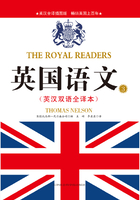
第15章 THE TRAVELLERS AND THE BEAR 旅行者和熊
Two men were going through a forest.
“I am afraid,” said one, “that we may meet with wild beasts; I see the tracks of their paws on the ground.”
“Fear nothing, friend Quickwit,” cried the other, whose name was Braggart.“In case of an attack we shall stand by one another like men. I have a strong arm, a stout heart, and—”
“Hark!” cried the first in alarm, as a low growl was heard from a thicket near. In an instant Braggart, who was light and nimble, climbed up a tree like a squirrel, leaving his friend, who was not so active, to face the danger alone!
But Quickwit's presence of mind did not fail him. He could not fight, he could not fly; but he laid himself flat on the ground, and held his breath, so as to appear quite dead. Out of the thicket rushed a huge bear, and at once made up to poor Quickwit; while Braggart looked down, trembling, from his perch in the tree.
One may guess what were the feelings of Quickwit when the bear snuffed all round him, coming so near that he could feel its warm breath, when its muzzle was close to his ear! But Quickwit did not wince or move; and the bear, thinking him dead, plunged again into the thicket, leaving him quite unharmed!
When Braggart saw that the danger was over, he came down from the tree. Somewhat ashamed of his cowardly conduct, he tried to pass off the matter with a joke.
“Well, my friend Quickwit,” he said, “what did the bear say to you when he whispered into your ear?”
“He told me,” replied Quickwit, “never again to trust a boaster like you!”
The hour of danger often shows that the greatest boasters are the greatest cowards. Let courage be proved by deeds, not by words.
Questions
What were the names of the two friends? Which appeared to be the braver, from his way of speaking? What did he do when the growl of the bear was heard? Who is lying close to the bear in the picture? Is he dead, or what? How did the other try to pass off the matter? What was the bear's advice?
Pronunciation
Quick'-wit ap-pear' squir'-rel cow'-ard-ly leav'-ing
Brag'-gart con'-duct trem'-bling whis'-pered boast'-ers
at-tack' cour'-age un-harmed' think'-ing dan'-ger
Write
thicket muzzle boasters
squirrel trembling cowardly
presence unharmed whispered
两个旅行者正在穿越一片森林。
“我很害怕,”其中一个人说,“我害怕我们可能会遇到野兽;我看到地面上有它们的爪印。”
“不要害怕,‘智多星’朋友,”另一个绰号“牛皮大王”的旅行者喊道,“如果发生袭击的话,我们要像男人一样互相支持。我有坚强的臂膀,勇敢的心脏,还有——”
“听!”听到浓密的灌木丛里传来低沉的咆哮声,“智多星”不禁惊慌地喊道。这时,身形轻巧、反应灵敏的“牛皮大王”立马像松鼠一样爬到了树上,将他腿脚不大灵活的朋友独自置于危险之地!
但是“智多星”的头脑一点都不输给他的朋友。虽然不能反抗、不能飞出去,但是他平躺在了地上,屏住呼吸,佯装死去。茂密的灌木丛里冲出一头体型巨大的熊,这头熊一出来,就向“智多星”的方向跑去;当“牛皮大王”从树上往下看的时候,不禁颤抖起来。
大家可能会猜想,当熊围着“智多星”左嗅嗅,右嗅嗅,口鼻离得他那么近的时候,当“智多星”都能听到熊温热的呼吸的时候,他是什么感受啊。但是“智多星”既没有畏缩,也没移动。熊认为他已经死了,于是又跃入灌木丛中,“智多星”毫发无损!
“牛皮大王”眼见危险已经过去了,就从树上爬了下来。他为自己胆小的举动感到羞愧,于是就想开个玩笑把刚才的事掩饰过去。
“哦,我的‘智多星’朋友,”他说,“那头熊刚才都向你耳语什么了呀?”
“他告诉我,”“智多星”回答道,“不要再相信一个像你这样吹牛的人!”
在危险来临之时,那些最能吹牛的人往往是最胆小的。勇气是通过行动,而不是语言来体现的。